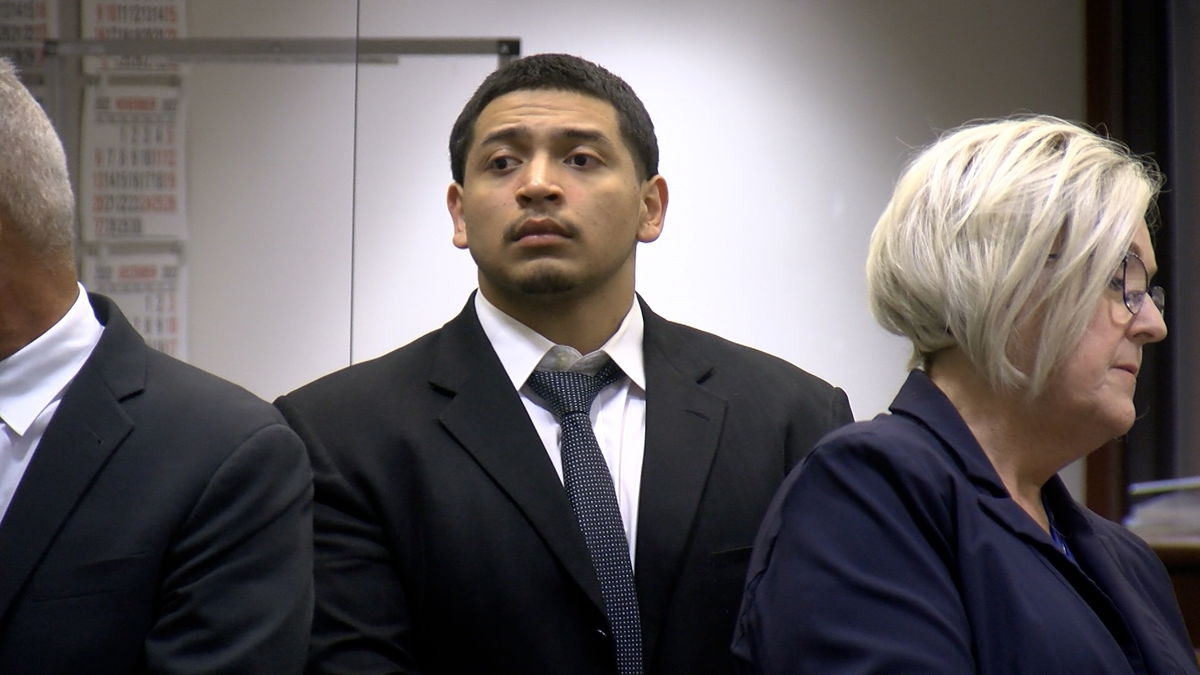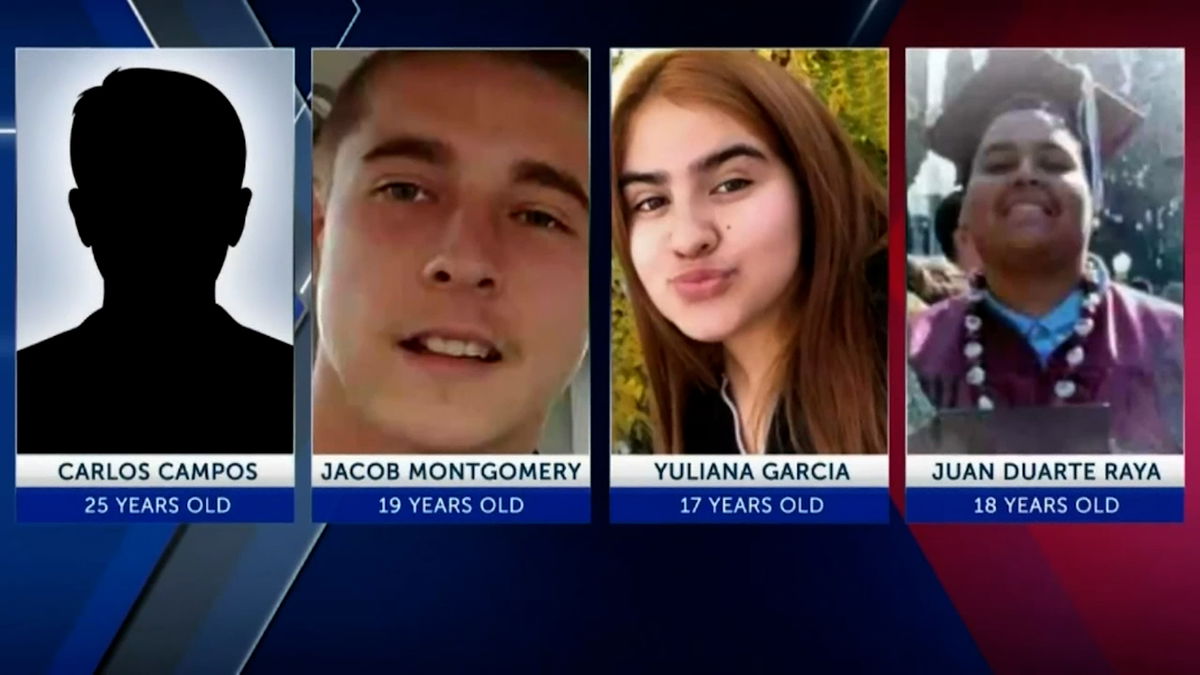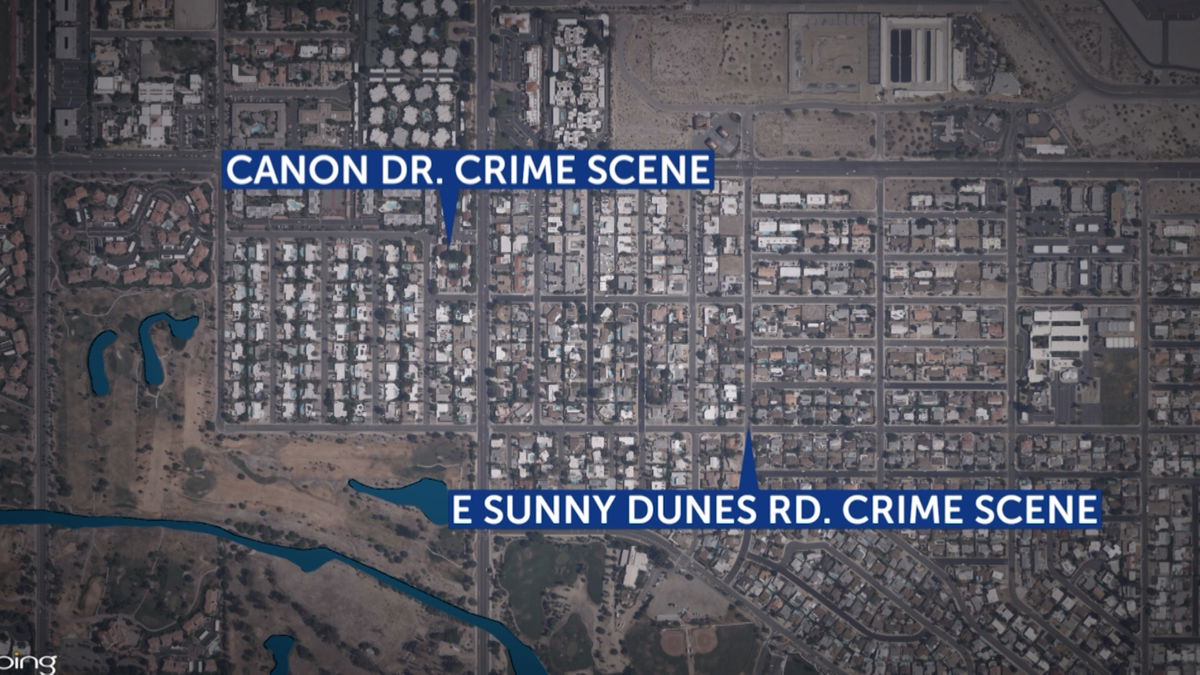Blood stain pattern interpreter testifies in Palm Springs quadruple murder retrial
Tuesday in the trial for Palm Springs quadruple murder suspect Jose Larin Garcia, a former criminalist and blood stain pattern interpretation expert was on the stand.
Larin Garcia is accused of murdering four people in Palm Springs in 2019. His first trial ended earlier this year with a deadlocked jury.
The jury got a crash course in how blood spatter and physics in this case were used to reconstruct the victims' positions in their final moments.
Blood stain pattern interpreter Craig Ogino was asked to analyze blood that spattered on the crashed Toyota Corolla in which three of the victims were shot.
Ogino used the size, direction and angles of blood stains to determine a "point of origin," or where the blood came from
Ogino reviewed at least four stains with distinct and observable characteristics.
Using a protractor, yarn, trigonometry, and by determining the direction of the blood, he was able to find points of origin which he is expected to detail in the coming days.
In the first trial, Ogino dismantled the key defense argument that there was another person, the real shooter, in the back seat of the car with the victims and Larin Garcia.
It is expected in this trial he will again mathematically prove there was no additional person there.
Chad Eyerly, a senior criminalist from the California Dept. of Justice was on the stand Monday.
He said DNA testing on several areas of the clothes showed varying levels of likelihood that contributors included the victims and Larin Garcia himself.
Eyerly testified that John Olvera, the man the defense says is guilty, is excluded from contributing to any of the DNA samples he examined.
BACKGROUND:
Jose Larin Garcia, a Cathedral City man, is accused of killing four people (ages 17-25): Carlos Campos, Jacob Montgomery, Yuliana Garcia and Juan Duarte Raya nearly four years ago.

The four victims were all found shot and killed on the night of February 3rd, 2019.
Three of the victims were found inside a car that crashed at Sunny Dunes and El Placer roads. The fourth victim was discovered in the street on Canon Dr. few blocks away.

When police arrived on scene, they found Larin Garcia hiding under a truck. They say he appeared intoxicated and covered in blood.
Larin Garcia was taken to Desert Regional Medical Center for treatment. Security footage shows him running from the hospital later that night.

Detectives have testified he then went to a friend’s house who he had buy him a one-way bus ticket to Florida using a fake name. Prosecutors say he was preparing to flee – shaving his head and beard to change his appearance. He was arrested waiting at the bus stop.
Larin Garcia is charged with four counts of murder. He also faces a special-circumstance allegation of committing multiple murders, opening him to the death penalty if convicted.
WEEK 7 IN COURT:
After about a month off from the trial, the judge gave consideration to a defense request for a mistrial due to new evidence being discovered nearly four years after the crimes.
The mistrial was ultimately denied and the most incriminating piece of evidence was excluded.
The jury returned and testimony continued with a DNA expert.
WEEK 6 IN COURT:
A Palm Springs detective testified about finding a variety of ammunition in Larin Garcia's bedroom.
The judge excused the jury for nearly a month after new, incriminating evidence previously thought to be lost was discovered.
WEEK 5 IN COURT:
A forensic toxicologist testified about whether drugs or alcohol were detected in the victims' blood samples. A fingerprint examiner who processed seven 9mm bullet casings in this case said he did not find any fingerprints on them.
A DOJ criminalist and weapons expert told the jury after examining the bullet casings from the scene that she believes they were all fired from the same weapon.
Jurors heard an hours-long recording of the undercover operation in Larin Garcia's jail cell.
An undercover agent gave testimony about what Larin Garcia told him while he was posing as an inmate in jail.
WEEK 4 IN COURT:
A friend of Larin Garcia's told the jury that the defendant showed him a gun and threatened to kill someone just days before the murders.
A PSPD detective testified about evidence she collected from the scene and security video she retrieved of Larin Garcia running out of the hospital.
A girlfriend of one of the victims' spoke about showing police Facebook messages sent the night of the murders regarding the fentanyl drug deal at the heart of these murders.
The man the defense says claimed responsibility for the murders testified he did not kill the four victims in this case.
WEEK 3 IN COURT:
Last week, a family friend who harbored Larin Garcia after he fled the from the hospital testified. The jury also heard from the investigator who arrested him later that night at an Indio bus stop.
Larin Garcia's mother took the stand, revealing he called her the night of the murders and she brought him clothes and a cell phone after he ran from the hospital.
Medical examiners testified the victims were all killed instantly by gunshot wounds to the head.
A friend of the defendant spoke about a key phone call she got from the defendant just after the murders happened.
WEEK 2 IN COURT:
The jury heard from a police investigator and a friend of some of the victims.
A hospital nurse who treated Larin Garcia as a trauma patient the night of the murders testified he ran from the emergency department.
A Palm Springs police officer gave testimony key to the defense argument that another man carried out the shootings.
The jury was brought on-location to the scene of the crimes.
WEEK 1 IN COURT:
During opening statements, prosecutor and Deputy District Attorney Samantha Paixao asked the jury to hold Larin Garcia responsible for the four lives she said he stole.
Defense attorney John Patrick Dolan argued that another man, John Olvera, was responsible for the murders.
The jury heard from some of the first people on scene after the murders, including neighbors who saw the dead bodies and the police officer who first made contact with the suspect.
